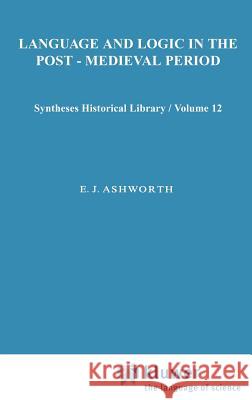Language and Logic in the Post-Medieval Period » książka
Language and Logic in the Post-Medieval Period
ISBN-13: 9789027704641 / Angielski / Twarda / 1974 / 309 str.
Keckermann remarked of the sixteenth century, "never from the begin- ning of the world was there a period so keen on logic, or in which more books on logic were produced and studies oflogic flourished more abun- dantly than the period-in which we live. " 1 But despite the great profusion of books to which he refers, and despite the dominant position occupied by logic in the educational system of the fifteenth, sixteenth and seven- teenth centuries, very little work has been done on the logic of the post- medieval period. The only complete study is that of Risse, whose account, while historically exhaustive, pays little attention to the actual logical 2 doctrines discussed. Otherwise, one can tum to Vasoli for a study of humanism, to Munoz Delgado for scholastic logic in Spain, and to Gilbert and Randall for scientific method, but this still leaves vast areas untouched. In this book I cannot hope to remedy all the deficiencies of previous studies, for to survey the literature alone would take a life-time. As a result I have limited myself in various ways. In the first place, I con- centrate only on those matters which are of particular interest to me, namely theories of meaning and reference, and formal logic.











